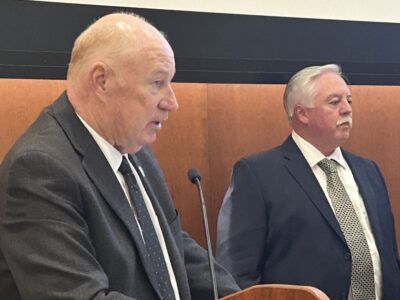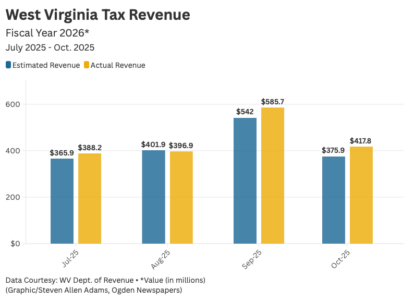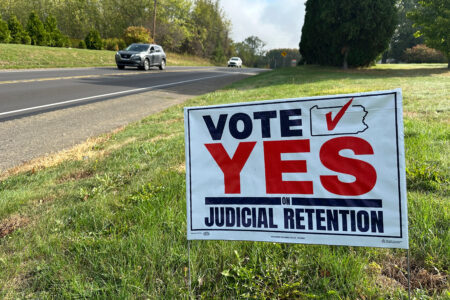West Virginia Public Workers Learn About Changes To Health Coverage at Ohio County Public Hearing

photo by: Joselyn King
Dale Lee, left, co-president of Education West Virginia, and Eric Householder, secretary for the West Virginia Department of Administration, address those affected by a proposed increase in Public Employees Insurance Agency premiums during a public hearing Monday at The Highlands Events Center.
TRIADELPHIA — Members of the Public Employee Insurance Agency insurance and Retiree Health Benefit Trust Fund board are explaining to subscribers the changes they are making to help shore up the plans starting in 2027.
PEIA/RHBT board members were present for a public hearing Thursday night at The Highlands Event Center in Ohio County.
The members are proposing a 3% aggregate premium increase for 2027, less than the double-digit increases implemented in recent years.
The average family tier spousal monthly surcharge, though, will increase another $200 — bringing it to $550 a month.
Dale Lee, co-president of Education West Virginia, suggested the PEIA board work with the Legislature to create tiers for the surcharge, so that lower-earning school employees aren’t paying the same amount to insure their spouse as the superintendent would.
He explained the existing Plan D will be converted into a lower actuarial value plan to create what could be a lower cost option to younger PEIA members with lower medical bills.
Under this plan, premiums would decrease 34%, while the amount of coinsurance paid by PEIA would decrease from 80% to 75%.
Deductibles under the plan would increase 425%, while the maximum out of pocket expense would increase by 55%.
“About 85% of participants are in Plan A, and not everybody needs to be in Plan A,” Lee said. “There are many who are young and healthy and have very little health insurance costs.
“(Lower tiers) could be the best plan for you and help you financially.”
The names of each of the plans available as an option to subscribers also will be changed.
Plan A will be renamed “PPB Gold,” while what was formerly Plan C now will be the “PPB Gold High Deductible Plan.”
Plan B will be “PPB Silver,” and the former Plan D will be named the PPB WV Bronze High Deductible Plan.”
Retired state employees will see a non-Medicare premium increase of 3%. This comes as RHBT is showing financial pressures amid assumed increase in Medicare Advantage Prescription Drug capitations.
Unless changes are made, the Premium Stabilization Reserve (PSR) will be depleted in fiscal year 2027.
Lee noted PEIA went from 2018 to 2022 without any premium increases. Since that time there have been yearly increases of 24.5%, 10.5% and 14%.
“So it has far made up for that period in time when there were no increases,” he said.
Lee added that frustration among public employees about the increases should be directed toward governors and legislatures, and not the PEIA board.
He commended members for keeping administrative costs at just 3.32% The remaining 96.68% of PEIA/RHBT expenses represent medical and pharmacy claims and capitations, according to information reported by the PEIA board.
“The low administrative costs are one of the main reasons why we do not ever need to privatize PEIA,” Lee said.
While those present expressed they weren’t happy about a 3% increase in premiums, they were pleased it wasn’t a double-digit increase as in past years.
A number of those speaking at the hearing also talked about their long-time doctors dropping them because they could no longer accept PEIA insurance through Humana. Doctors have told their patients the company has been taking too long to pay bills, and in many cases aren’t providing reimbursement.
Others said insurance providers through PEIA are sending them medical products and offering free medical services they don’t need, and they suspect this is driving up overall costs.





